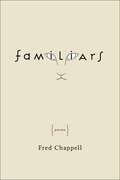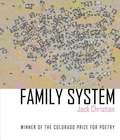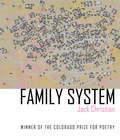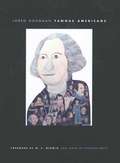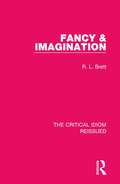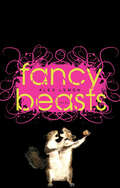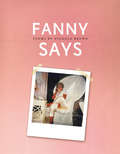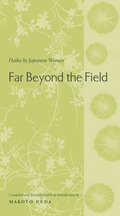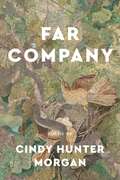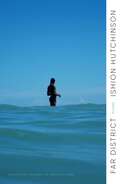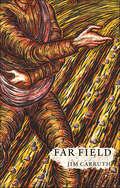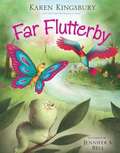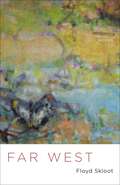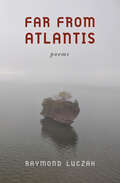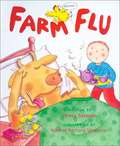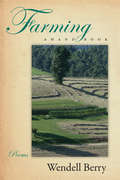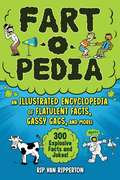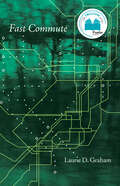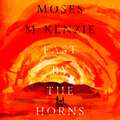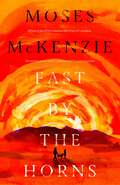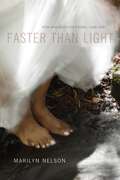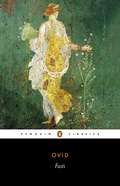- Table View
- List View
Familiars: Poems
by Fred ChappellSolitary, graceful, and contemplative, cats have inspired poets from Charles Baudelaire to Margaret Atwood to serve as their chroniclers and celebrants. They have appeared, wrapped in their inscrutability, in verse both sensual and spiritual, weary and whimsical. With Familiars, Fred Chappell proves himself a worthy addition to the fellowship of poets who have sought to immortalize their beloved cats.Here are cats as personalities, cats as art objects and historical figures, cats as reflections of human temperament. Chappell salutes the literary cats of decades past -- George Herriman's happy-go-lucky Krazy Kat, Don Marquis's grande dame mehitabel -- and the imagined cats who claim as their companions the characters from Chappell's own past poems. The cats in Familiars are alert and affectionate, equal parts cherished friends and unknowable mysteries.
Family System
by Jack Christian"Family System is one of the most specific and clarifying books of poetry I've ever read. It is filled with choices--made, to be made, not made--handled with a poetic understanding that what seems arbitrary will be inevitable when said with the right words while singing the right songs. This is a stand-out first book, introducing a first-rate original talent, doing powerful work, making quintessentially lyrical choices. Don't miss this book. " --Dara Wier "It seems that Jack Christian's brain is able to produce tiny lucid creatures, have them run and sprinkle over a map of an unknown world with joy, speed and delight. Even stranger, he's somehow the spiritual offspring of very different ancestors: Pascal's Esprit de geometrie and Scandinavian mythology. 'I was eulogizing a squirrel in a shoebox. ' Brilliant. " --Toma Šalamun
Family System (Colorado Prize for Poetry)
by Jack ChristianWinner of the 2012 Colorado Prize for Poetry, selected by Elizabeth Willis "Family System is one of the most specific and clarifying books of poetry I’ve ever read. It is filled with choices—made, to be made, not made—handled with a poetic understanding that what seems arbitrary will be inevitable when said with the right words while singing the right songs. This is a stand-out first book, introducing a first-rate original talent, doing powerful work, making quintessentially lyrical choices. Don’t miss this book.” —Dara Wier “It seems that Jack Christian’s brain is able to produce tiny lucid creatures, have them run and sprinkle over a map of an unknown world with joy, speed and delight. Even stranger, he’s somehow the spiritual offspring of very different ancestors: Pascal’s Esprit de Geometrie and Scandinavian mythology. ‘I was eulogizing a squirrel in a shoebox.’ Brilliant.” —Tomaž Šalamun
Famous Americans
by Loren GoodmanThe imagery of poetry has been marked at times by a vital tension between basic convention and the unexpected. The polar relation between them began to produce radically new effects during the nineteenth century in France, with the precursors of surrealism and the ironies of the poems of Tristan Corbière, and then in the twentieth century with the beginning of the age of modernism.
Fancy & Imagination (The Critical Idiom Reissued #5)
by R. L. BrettFirst published in 1969, this book provides a concise and helpful introduction to the terms ‘fancy’ and ‘imagination’. Although they are generally associated with Samuel Taylor Coleridge, the work begins with a discussion the history of these concepts which were also known to Aristotle, the Elizabethans, Hobbes, Locke and Blake. It then goes on to examine Coleridge’s theory of imagination and the distinction he drew between fancy and imagination. This work will be of particular interest to those studying Coleridge and the Romantic Movement.
Fancy Beasts: Poems
by Alex LemonCalifornia wildfires, the 2008 election, plastic surgery, Larry Craig, wildfires, Wal-Mart, and rampant commercialism—in Fancy Beasts, Alex Lemon takes on American media culture, the obscene foil for personal legacies of violence and violation.The poems of this collection are a workout: vigorous and raw, frenetic and fearless. Yet they are also composed and controlled, pared down and sculpted, with a disarming narrative simplicity and directness. Even when dealing with toxic content—including the turning point in a life of abuse, in which the recovering victim/perpetrator puzzles through the paradigm of son-to-husband-to-father—Lemon&’s point of view is always genuine and trustworthy.A frank, funny, and inimitably frenetic vision of post-millennial America, Fancy Beasts is a stunning achievement from Alex Lemon.
Fanny Says
by Nickole BrownAn “unleashed love song” to her late grandmother, Nickole Brown’s collection brings her brassy, bawdy, tough-as-new-rope grandmother to life. With hair teased to Jesus, mile-long false eyelashes, and a white Cadillac Eldorado with atomic-red leather seats, Fanny is not your typical granny rocking in a chair. Instead, think of a character that looks a lot like Eva Gabor in Green Acres, but darkened with a shadow of Flannery O’Connor. A cross-genre collection that reads like a novel, this book is both a collection of oral history and a lyrical and moving biography that wrestles with the complexities of the South, including poverty, racism, and domestic violence."Nickole Brown’s unleashed love song to her grandmother is raucous and heart-rending, reflective and slap-yo-damn-knee hilarious, a heady meld of lyrical line and life lesson. Brown is blessed to be blood-linked to such a shrewd and singular soul, and the poet's mix of monologue, myth, and unbridled mayhem paints a picture of a proper Southern lady who is just—well, unforgettable." —Patricia Smith"In Fanny Says, Nickole Brown distills the whole of America into one woman: bawdy, loving, racist, battered, healed, and gorgeous with determination. Our country has no history that does not touch the South. Our divisions are our unions. Here, Brown unleashes a voice returned to teach us a lesson. Reader, fair warning: you can’t hide from Fanny. You will be changed by this book." —Rebecca Gayle Howell
Far Beyond the Field: Haiku by Japanese Women
by Makoto UedaFar Beyond the Field is a first-of-its-kind anthology of haiku by Japanese women, collecting translations of four hundred haiku written by twenty poets from the seventeenth century to the present. By arranging the poems chronologically, Makoto Ueda has created an overview of the way in which this enigmatic seventeen-syllable form has been used and experimented with during different eras. At the same time, the reader is admitted to the often marginalized world of female experience in Japan, revealing voices every bit as rich and colorful, and perhaps even more lyrical and erotic, than those found in male haiku.
Far Beyond the Field: Haiku by Japanese Women (Translations From The Asian Classics Ser.)
by Ed. Ueda MakotoFar Beyond the Field is a first-of-its-kind anthology of haiku by Japanese women, collecting translations of four hundred haiku written by twenty poets from the seventeenth century to the present. By arranging the poems chronologically, Makoto Ueda has created an overview of the way in which this enigmatic seventeen-syllable form has been used and experimented with during different eras. At the same time, the reader is admitted to the often marginalized world of female experience in Japan, revealing voices every bit as rich and colorful, and perhaps even more lyrical and erotic, than those found in male haiku.Listen, for instance, to Chiyojo, who worked in what has been long thought of as the dark age of haiku during the eighteenth century, but who composed exquisitely fine poems tracing the smallest workings of nature. Or Katsuro Nobuko, who wrote powerfully erotic poems when she was widowed after only two years of marriage. And here, too, is a voice from today, Mayuzumi Madoka, whose meditations on romantic love represent a fresh new approach to haiku.
Far Company: Poems By Cindy Hunter Morgan (Made in Michigan Writers Series)
by Cindy Hunter MorganIn Far Company, we hear Cindy Hunter Morgan thinking about the many ways we carry the natural world inside of us as a kind of embedded cartography. Many of these poems commune not only with lost ancestors but also past poets. We hear conversations with Emily Dickinson, James Wright, Walt Whitman, and W. S. Merwin. These poets, who are part of Hunter Morgan’s poetic lineage, are beloved figures in the far company she keeps, but the poems she writes are distinctly hers. Poet Larissa Szporluk remarked, "The poems in this collection are quiet and deceptively simple. My first response was to be amazed by a seeming innocence in delivery—straightforward, picturesque, and compassionate—that then matured like a crystal into something precious and masterful. We are left with the whole forest having met all the trees one by one. There is so much respect in this collection—respect for natural processes that include intergenerational relationships, shared territories, and myths." The poems in Far Company reveal a mind and a heart negotiating both self and world with compassion and invention. They are cinematic in the way they navigate loss, memory, dislocation, hope, and love—abstractions evoked in deeply specific and nuanced ways. There is the drone that flies over Hunter Morgan’s grandparents’ farm before the house burns and the stag-handled knife in a pocket, its single blade "folded inside like a secret" on a train in Greece. But this collection is full of quieter cinema, too—a grandfather bending to cinch the girth of a horse, days "green / with snap peas and wild tendrils," and "raindrops beading like sweat / on the lips of snapdragons." The root of this book is Hunter Morgan’s love for family and her love for the land her family has shared. These poems map a journey to many places, inward and outward, and engage with the natural world and the built world, moving between both of those environments in ways that acknowledge the complexities of such crossings. Often melancholic but never sentimental, this collection belongs with any reader who seeks out literature in the organic world.
Far District: Poems
by Ishion Hutchinson"A marvelous book of generous, giving poems." —Yusef Komunyakaa, author of Everyday Mojo Songs of EarthFar District, the transporting debut by the author of House of Lords and Commons, charts the spiritual path of a poet-speaker caught between two spheres: the culture of bush people and a luminous, dangerous sea of myth. Crafting an impressionistic portrait of his youth in Jamaica, Ishion Hutchinson explores the West Indian distrust of European literature and mythology. The speaker fears the land of myth because he is loyal to the bush people, but he also desires to transcend his physical and intellectual poverty. Little by little, the two cultures come together as the speaker begins grafting childhood memories onto the realm of imagination, shaped by art, music, literature, and new glimpses of the world.Written in both traditional and formless verse, as well as in English and Jamaican patois, Far District is an indelible, urgent collection. As the PEN/Joyce Osterweil Award committee said of its 2011 winner, “Far District is a classic, which is to say a rare and exemplary first book.”
Far Field
by Jim CarruthFar Field is the third and final book in The Auchensale Trilogy, a series of poetry cycles capturing the changing rural landscape of the West of Scotland. Following on from its predecessors Black Cart and Bale Fire, the book consists of three cycles bound together by footers. A number of poems in the early part of the book are in response to paintings by the Glasgow Boys particularly those painted during their time spent in agricultural communities. Many of the poems are highly personal with a number about family members. These include a series of elegies for his late father. It also focuses on the present day looking to the challenges ahead for the family farm and that passing baton to the next generation.
Far Flutterby
by Karen KingsburyCody the caterpillar is unhappy and wonders if there's more to his life than just branches and leaves. When two winged creatures pay a visit, they encourage him to have faith and trust in God's plan. Cody doesn't understand what they mean, and soon becomes stuck in a cocoon. He struggles to break free and finally emerges with a beautiful pair of wings. In the end he realizes that it's the struggles in life that allow us to soar.
Far West: Poems
by Floyd SklootFloyd Skloot’s Far West intertwines the past and present, as time alternates between racing and standing still. Crafting poems that confront memory lapses and painful recollections, Skloot traces his moments of purest perception and expression: his wife practicing music, his daughter finding delight in the presence of wildlife, Vladimir Nabokov able to lose himself when playing goalie in a soccer match. A poem about a forgotten word or name can lead to one about a song that refuses to stop playing over and over in our minds, or to an evocation of a long-dead futuristic novelist who comes back from the afterlife to find a world even stranger than any he imagined. In poems that range from traditional forms and short lyrics to longer narratives and free verse, Skloot explores how emotional experiences—memory and forgetting, love and loss, reverie and urgent attention—all come together in our search for coherence and authentic self-expression.
Far from Atlantis: Poems
by Raymond LuczakIn Far from Atlantis, Raymond Luczak makes use of traditional poetic forms to tell the stories of two vastly different worlds: the Upper Peninsula of Michigan, which often looks like an island on the map, and the fabled island of Atlantis. The poems in this collection are rooted in the natural world, with the power of water as a means for escaping the cruelty and tedium of an ableist society. While recounting his troubled childhood as the only deaf person in a large hearing family, Luczak aligns himself with mythological, monstrous, and superhuman beings who, like him, exist on the margins. The narratives invoked and the worlds created in these poems are both autoethnographic and speculative, and include figures lost to history like Lucy Frances Fitzhigh Hooe and Frances Peterson, along with 1970s pop culture icons like the Six Million Dollar Man and Wonder Woman.
Farm Flu
by Teresa BatemanWhat happens when Mom is gone and all the animals get the flu? Easy Reader
Farming: Poems
by Wendell BerryThe America many people would like to believe in is convincingly explored in this volume of poems by a writer close to the heart of things. The sanity and eloquence of these poems spring from the land in Kentucky where Wendell Berry was born, married, lives, farms, and writes. From classic pastoral themes both lyrical and reflective, to a verse play, to a dramatic narrative and the manic, entertaining, prescient ravings of Berry's Mad Farmer, these poems show a unity of language and consciousness, skill and sensitivity, that has placed Wendell Berry at the front rank of contemporary American poets.
Fart-o-Pedia: An Illustrated Encyclopedia of Flatulent Facts, Gassy Gags, And More!—300 Explosive Facts and Jokes!
by Rip Van RippertonAn colorfully illustrated encyclopedia of fart facts, jokes, riddles, and more! Flatulently funny and perfect for ages 7–12! With humorous entries that include types of farts, food items that cause gas, what farts are called in different countries, jokes and riddles, sidebars, science, rules, advice, how to&’s, and more, this book is the gassiest gift for the fart fan in any family. It contains a mishmash of information, perfect for bathroom reading and rippin' jokes with your pals. Entries include:Dog, the: Who you blame when you pass gas at the dinner table.How to save a fart for later.Fart in a glass Mason jar.Quickly put the lid on and screw it tightly.Have a friend open it later.Once you&’ve done this, send us a note telling us whether or not it worked."Hoof Hearted Ice Melted:" Say it out loud five times. You&’ll get it.Pull my finger: What someone says to a friend when they have a fart locked and loaded. Once the friend pulls the finger, the fart is unleashed. Great trick that only works once.Silent but deadly (SBD): A fart that comes out with barely a whisper but then knocks everyone out with its noxious stench.
Fast Commute: A Poem
by Laurie D. GrahamA powerful book-length poem on environmental destruction and the violences of colonial nation-states from the acclaimed author of Settler Education. Here is a lament for places in flux, where industrial, commercial, or suburban development encroaches or invades. From Highway 401 to Refinery Row east of Edmonton, from Lake Ontario to the Fraser River, this long poem takes aim at the structures that support ecological injustice and attempts new forms of expression grounded in respect for flora, fauna, water, land, and air. It also wrestles with the impossibility of speaking ethically about &“the environment&” as a settler living within and benefiting from the will to destroy that so often doubles as nationalism. Following physical routes and terrains, Fast Commute exists both within and outside the dissociative registers of colonialism and capitalism. This deeply engaging book offers a way to see, learn about, and live in relationship with other-than-human life, and to begin dealing with loss on a grand scale.
Fast Draw Freddie
by Bobbie HamsaFreddie draws all kinds of pictures fast: big, small, fat, cat, and pictures of Mom and Dad too.
Fast by the Horns: The hotly anticipated second novel from the prizewinning author of An Olive Grove in Ends
by Moses McKenzieFrom the Hawthornden Prize-winning author of An Olive Grove in Ends, a powerful story of broken dreams and divided loyaltiesBristol, 1980. In the tight-knit neighbourhood of St. Pauls, 14-year-old Jabari is proud of his position as the only son of revered community leader Ras Levi. Raised in a world of sus laws and council neglect, Jabari finds hope in his Rastafari faith, which offers the comforting vision that one day he and his fellow believers will repatriate to the motherland, where they will at last be free from oppression and prejudice.But in St Pauls a local firebrand activist has been arrested, and violence soon overflows, pulling both father and son into its maelstrom. As Jabari rages against the iniquity, a chance encounter with a young Black child gifts him an opportunity for justice - or is it revenge?Praise for An Olive Grove in Ends:'Tough yet tender' Observer - 10 Best Debut Novelists of 2022''Luminous' Cherie Jones'Moses' talent is off the scale' Donal Ryan'Remarkable' Nathan Harris'Consummately crafted' Patrick McCabe
Fast by the Horns: The hotly anticipated second novel from the prizewinning author of An Olive Grove in Ends
by Moses McKenzieFrom the Hawthornden Prize-winning author of An Olive Grove in Ends, a powerful story of broken dreams and divided loyaltiesBristol, 1980. In the tight-knit neighbourhood of St. Pauls, 14-year-old Jabari is proud of his position as the only son of revered community leader Ras Levi. Raised in a world of sus laws and council neglect, Jabari finds hope in his Rastafari faith, which offers the comforting vision that one day he and his fellow believers will repatriate to the motherland, where they will at last be free from oppression and prejudice.But in St Pauls a local firebrand activist has been arrested, and violence soon overflows, pulling both father and son into its maelstrom. As Jabari rages against the iniquity, a chance encounter with a young Black child gifts him an opportunity for justice - or is it revenge?Praise for An Olive Grove in Ends:'Tough yet tender' Observer - 10 Best Debut Novelists of 2022''Luminous' Cherie Jones'Moses' talent is off the scale' Donal Ryan'Remarkable' Nathan Harris'Consummately crafted' Patrick McCabe
Fast by the Horns: The hotly anticipated second novel from the prizewinning author of An Olive Grove in Ends
by Moses McKenzie'With the sharp and delectable music of its dialect, the book grabs you by its teeth from the first page and never quite lets go . . . This is an urgent novel of ideas, constantly propelled by the narrator's wildfire voice' SAFIYA SINCLAIR, GUARDIANFrom the Hawthornden Prize-winning author of An Olive Grove in Ends, a powerful story of broken dreams and divided loyaltiesBristol, 1980. In the tight-knit neighbourhood of St. Pauls, 14-year-old Jabari is proud of his position as the only son of revered community leader Ras Levi. Raised in a world of sus laws and council neglect, Jabari finds hope in his Rastafari faith, which offers the comforting vision that one day he and his fellow believers will repatriate to the motherland, where they will at last be free from oppression and prejudice.But in St Pauls a local firebrand activist has been arrested, and violence soon overflows, pulling both father and son into its maelstrom. As Jabari rages against the iniquity, a chance encounter with a young Black child gifts him an opportunity for justice - or is it revenge?Praise for An Olive Grove in Ends:'Tough yet tender' Observer - 10 Best Debut Novelists of 2022''Luminous' Cherie Jones'Moses' talent is off the scale' Donal Ryan'Remarkable' Nathan Harris'Consummately crafted' Patrick McCabe
Faster Than Light: New and Selected Poems, 1996-2011
by Marilyn NelsonConjuring numerous voices and characters across oceans and centuries, Faster Than Light explores widely disparate experiences through the lens of traditional poetic forms. This volume contains a selection of Marilyn Nelson's new and uncollected poems as well as work from each of her lyric histories of eighteenth-, nineteenth-, and twentieth-century African American individuals and communities.Poems include the stories of historical figures like Emmett Till, the fourteen-year-old boy lynched in 1955, and the inhabitants of Seneca Village, an African American community razed in 1857 for the creation of Central Park. "Bivouac in a Storm" tells the story of a group of young soldiers, later known as the Tuskegee Airmen, as they trained near Biloxi, Mississippi, "marching in summer heat / thick as blackstrap molasses, under trees / haunted by whippings." Later pieces range from the poet's travels in Africa, Europe, and Polynesia, to poems written in collaboration with Father Jacques de Foiard Brown, a former Benedictine monk and the subject of Nelson's playful fictional fantasy sequence, "Adventure-Monk!" Both personal and historical, these poems remain grounded in everyday details but reach toward spiritual and moral truths.
Fasti
by OvidWritten after he had been banished to the Black Sea city of Tomis by Emperor Augustus, the Fasti is Ovid's last major poetic work. Both a calendar of daily rituals and a witty sequence of stories recounted in a variety of styles, it weaves together tales of gods and citizens together to explore Rome's history, religious beliefs and traditions. It may also be read as a subtle but powerful political manifesto which derides Augustus' attempts to control his subjects by imposing his own mythology upon them: after celebrating the emperor as a Jupiter-on-earth, for example, Ovid deliberately juxtaposes a story showing the king of the gods as a savage rapist. Endlessly playful, this is also a work of integrity and courage, and a superb climax to the life of one of Rome's greatest writers.
